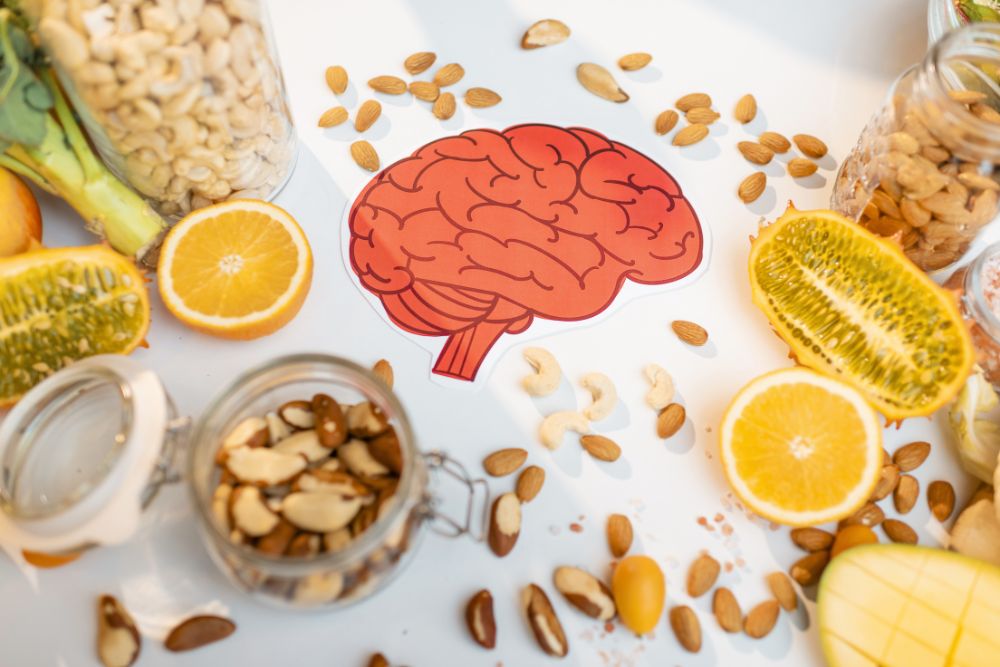Dietitian Blog | Jul 15 2025
Nutrition’s impact on brain health

Has a client or patient ever asked you if what they eat plays a role in improving their brain health? Whether they’re looking for nutrition guidance to help boost focus at work or school, maintain cognition as they age, or simply want to support their overall mood and mental health, the foods they choose to eat today have the potential to protect their brain health tomorrow and for many years beyond.
Dietitians often hear about people turning to supplements or the latest trendy brain-boosting product on the market, but none are as powerful as what is put on the plate. This blog explores how nutrition can support brain health and highlights the foods, vitamins, and dietary patterns that have been shown to be most beneficial. Additionally, it will share practical tips that can be shared with patients or clients to help nourish the body and brain throughout life.
Does nutrition affect memory, mood, and longevity?
Our brains use about 20% of our total daily energy for things like thinking clearly, managing emotions, storing memories, and repairing itself to keep cognitive function optimal. But the quality of what makes up this energy is important.
Emerging research shows that the foods we eat act as the building blocks for brain cell function, communication, and protection. Nutrients such as antioxidants, healthy fats, certain vitamins, and minerals are needed to carry out the following jobs:
- Reduce inflammation, which, if left untouched, could cause damage to brain cells over time
- Improve blood flow so that oxygen is delivered efficiently
- Support neurotransmitter production, which is needed for our mood, focus, and memory
- Enhance brain plasticity and its ability to adapt to certain conditions
One of the most studied dietary patterns for brain health is the Mediterranean-DASH Intervention for Neurodegenerative Delay (MIND) diet. As the name implies, it combines elements of both the Mediterranean and DASH diets. It also highlights some specific foods that have generally been associated with brain health.
Early research showed that people who adopted this diet experienced slower cognitive decline and a lower risk of Alzheimer’s disease, although there are varied results amongst studies. The MIND diet prioritizes natural, nutrient-dense foods, such as leafy greens, berries, nuts, whole grains, olive oil, fish, and legumes. And it limits highly processed and fried foods.
Foods to incorporate
Here are some of the most impactful foods you can eat to nourish your mind and maintain cognitive function:
|
Power-packed foods for brain health |
Why it helps |
Ways to incorporate into diet |
|
Leafy greens |
Antioxidants, vitamin K, and folate reduce inflammation |
Add to salads, wraps, or omelets |
|
Berries |
Flavonoids in berries support memory function |
Add to yogurt, oatmeal, or smoothie |
|
Fatty fish |
DHA (omega-3) is good for memory, focus, and learning |
Include salmon or sardines |
|
Nuts and seeds |
Omega 3s, vitamin E |
Eat alone as a snack, or add to trail mix, or add to salads |
|
Whole grains and legumes |
Provide energy, fiber, and B vitamins |
Choose whole grain options like quinoa, consider lentil/bean soups |
|
Olive oil |
Monounsaturated fats, antioxidants |
Use for sautéing or as a base for dressings and marinades |
|
Eggs |
Vitamins B6, B12, folate, and choline |
Breakfast staple, or could be a between-meal snack |
Foods to limit
While adding nutrient-dense foods is key to support overall brain health, it is also important to be mindful of what foods to limit. Certain foods and ingredients can increase inflammation, impair blood flow, and contribute to long-term cognitive decline. Here is what the research suggests reducing:
- Ultra-processed foods, such as packaged snacks, sugary cereals, instant soups and noodles, and deli meats, are high in saturated fats and/or added sugars that can have a negative effect over time.
- Added sugars found in sweetened beverages, such as soda, sports drinks, and juices, as well as sweet foods and candies.
- Trans fats and hydrogenated oils are considered unhealthy fats and are mainly found in highly processed baked goods and snacks. They can cause damage to brain cell membranes, which contributes to cognitive decline.
- Alcohol, even moderate use over a prolonged period, is linked to brain atrophy and loss of memory.
Complementary lifestyle habits
While it’s true that nutrition plays a big role, research shows that lifestyle habits complement nutrition quite well in protecting cognitive function and long-term brain health. Physical activity, quality sleep, stress management and mental health or social engagement all contribute to the bigger picture.
Exercise boosts blood flow to the brain and supports the growth of new brain cells. Even just a few short walks a week can make a difference. Quality sleep of 7-9 hours per night helps support memory, focus, and mood balance during the day. Managing stress wards off damage to brain cells and impaired memory. Daily practices, such as yoga, mindfulness, deep breathing, or time in the outdoors, all help lower stress. Which in turn protects cognitive health. And finally, mental health and social connection help keep the mind sharp and adapt to the challenges life brings.
Conclusion
As with so many health-related things, it’s all about the little things that build over time and add up to long-lasting positive results. Registered dietitians should feel empowered to educate and counsel patients to focus on nutrient-dense foods and prioritize good lifestyle habits that are within their control to maintain brain function, support their memory, stay focused, and even stabilize mood, for both the present and the future.
Dietitians On Demand is a nationwide staffing and recruiting company for registered dietitians, specializing in short-term, temporary, and permanent-hire positions in acute care, long-term care, and food service. We’re dedicated to dietitians and helping them enhance their practice and excel in the workplace. Check out our job openings, request your coverage, or visit our store today!
References
Barnes LL, Dhana K, Liu X, et al. The Trial of the MIND Diet for Prevention of Cognitive Decline in Older Persons. N Engl J Med. 2023(387)7:602-611.
Van den Brink AC, Brouwer-Brolsma EM, Berendsen AAM, van de Rest O. The Mediterranean, Dietary Approaches to Stop Hypertension (DASH), and Mediterranean-DASH Intervention for Neurodegenerative Delay (MIND) Diets Are Associated with Less Cognitive Decline and a Lower Risk of Alzheimer’s Disease—A Review. Adv Nutr. 2019(10)6:1040-1065.
Mintzer J, Donovan KA, Kindy AZ, et al. Lifestyle Choices and Brain Health. Front Med. 2019(6)1-11.
Chein S, Urban A. The MIND Diet: Meal Plans, Reviews, and Tips for 2024. U.S. News website. Available at https://health.usnews.com/best-diet/mind-diet. Published March 19, 2025. Accessed May 28, 2025.
Lachtrupp E. Mediterranean Diet Meal Plan to Help Support Brain Health. EatingWell website. Available https://www.eatingwell.com/article/7938895/mediterranean-diet-meal-plan-to-help-support-brain-health/. Published January 2, 2022. Accessed May 28, 2025.
Jennings KA. Best Foods for a Healthy Brain and Improved Memory. Healthline website. Available at https://www.healthline.com/nutrition/11-brain-foods. Published March 13, 2024. Accessed May 25, 2025.
Who we are
Dietitians On Demand is the nationwide leader in providing dietitians with jobs they love. If flexibility, competitive pay, a full benefits package, free CPEUs each month and a team dedicated to dietitians sound good to you, apply to our positions today.




